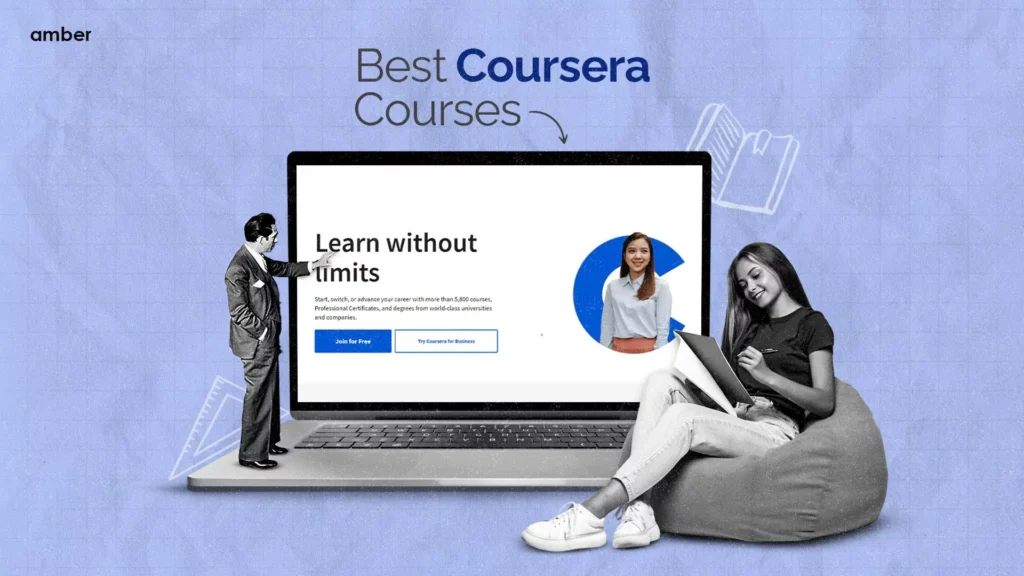Introduction: The Rise of Online Learning
Education is no longer limited to lecture halls or hefty textbooks. In today’s fast-paced world, learners need flexible, accessible, and affordable solutions to build skills and advance careers. That’s where Coursera, one of the world’s leading online learning platforms, steps in. Whether you’re a student, a working professional, or a lifelong learner, Coursera makes high-quality education accessible with just a few clicks.
This blog explores what Coursera is, who it’s designed for, its standout features, and why it has become a top choice for millions of learners globally.
What is Coursera?
Coursera is an online learning platform founded in 2012 by Stanford professors Andrew Ng and Daphne Koller. It partners with over 300 leading universities and companies, such as Yale, Stanford, Google, and IBM, to deliver courses, certificates, and even full degree programs online.
The platform is designed for:
- Students who want to learn beyond the classroom.
- Professionals aiming to upskill or reskill.
- Lifelong learners exploring personal interests.
- Organizations that need workforce training at scale.
With over 100 million users worldwide, Coursera has become a hub for affordable, flexible, and recognized learning.
Key Features and Benefits of Coursera
1. Wide Range of Courses and Specializations
Coursera offers more than 5,000 courses across categories like business, technology, data science, health, and humanities. Learners can take:
- Individual courses for quick upskilling.
- Specializations that combine multiple courses into a learning pathway.
- Professional certificates for industry-recognized credentials.
- Degree programs fully online from top universities.
2. Learn From Top Universities and Companies
Unlike many online platforms, Coursera partners with prestigious institutions. Imagine earning a certificate in Artificial Intelligence from Stanford or a Digital Marketing credential from Google—all without leaving your home.
3. Flexible and Self-Paced Learning
Most courses are asynchronous, meaning you can watch lectures, complete assignments, and take quizzes at your own pace. This flexibility is perfect for working professionals or students managing busy schedules.
4. Affordable Learning Options
While some courses are free, Coursera offers affordable paid options such as:
- Coursera Plus (annual subscription for unlimited access to 7,000+ courses).
- Pay-per-course pricing, often more cost-effective than traditional education.
Compared to university tuition, Coursera degrees cost a fraction—making world-class education more accessible.
5. Industry-Recognized Certificates
Coursera’s certificates aren’t just digital badges—they’re recognized by employers worldwide. Professional certificates from brands like Google, Meta, and IBM can directly boost employability in fields like IT, data analysis, UX design, and project management.
6. Interactive Learning Experience
Learning isn’t passive. Coursera offers:
- Quizzes and graded assignments.
- Peer-reviewed projects.
- Discussion forums for community learning.
These features ensure you’re not just watching videos—you’re actively building skills.
7. Mobile-Friendly Platform
With Coursera’s iOS and Android apps, you can download lectures, learn offline, and study on the go—perfect for commuters or those with limited internet access.
Why You Should Choose Coursera
1. Learn From the Best
Few platforms can match Coursera’s partnerships with top universities and Fortune 500 companies. This ensures that every course is designed with expertise and credibility.
2. Advance Your Career
Employers value Coursera credentials. Whether you’re breaking into tech, moving up in your current job, or switching industries, Coursera provides a pathway with practical, in-demand skills.
3. Affordable, High-Value Education
Traditional education often comes with high costs and geographic limitations. Coursera eliminates those barriers, offering affordable courses that deliver real-world value.
4. Suitable for All Levels of Learners
- Beginners can explore entry-level certificates.
- Intermediate learners can dive deeper into specializations.
- Advanced learners can pursue online master’s or bachelor’s degrees.
5. Global Accessibility
Coursera is available in multiple languages, making it accessible for learners across the globe. Whether you’re in New York, Mumbai, or Nairobi, world-class learning is at your fingertips.
How Coursera Stands Out Against Competitors
While platforms like Udemy, edX, and Skillshare are popular, Coursera has unique strengths:
- University-backed degrees and certificates (not just individual instructors).
- Accredited degree programs from globally ranked universities.
- Corporate training solutions for businesses to train employees at scale.
This makes Coursera both a personal and professional learning powerhouse.
Popular Categories on Coursera
- Data Science & AI: Machine learning, Python, and AI by Stanford and DeepLearning.AI.
- Business: Leadership, finance, and digital marketing from top schools like Wharton.
- Technology: Cloud computing, cybersecurity, and software development from Google and IBM.
- Health: Public health, mental well-being, and medical training courses.
- Personal Development: Communication, creativity, and productivity skills.
Conclusion: Coursera’s Role in the Future of Learning
The future of education is digital, flexible, and accessible—and Coursera is at the heart of this transformation. With thousands of courses from leading universities and companies, affordable pricing, and career-focused certifications, Coursera has empowered millions to achieve their learning and career goals.
Whether you’re aiming to land a new job, climb the career ladder, or simply learn something new, Coursera offers the perfect balance of quality, flexibility, and value.
Start your learning journey with Coursera today—and unlock a world of opportunity.




